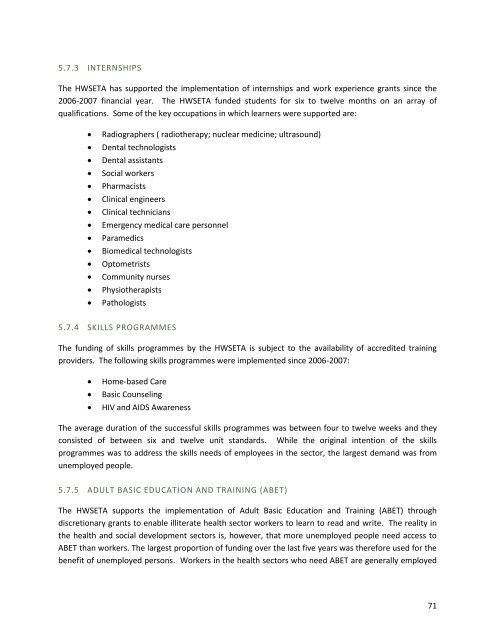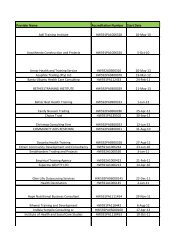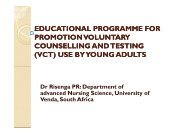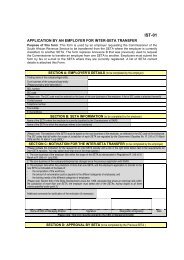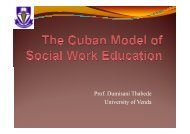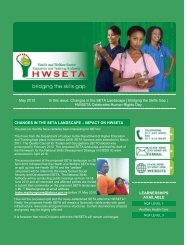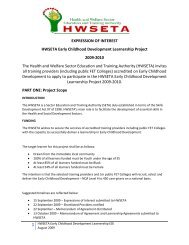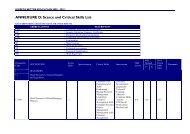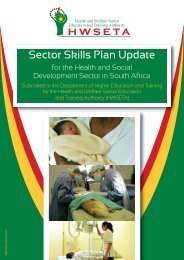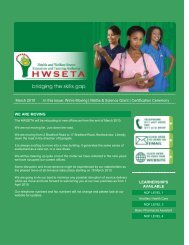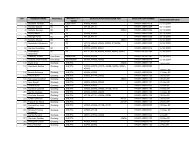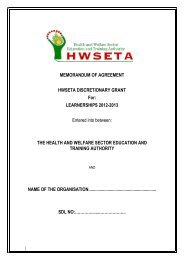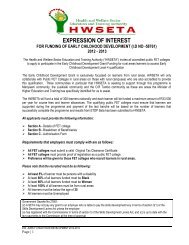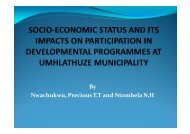sector skills plan for the health sector in south africa
sector skills plan for the health sector in south africa
sector skills plan for the health sector in south africa
Create successful ePaper yourself
Turn your PDF publications into a flip-book with our unique Google optimized e-Paper software.
5.7.3 INTERNSHIPS<br />
The HWSETA has supported <strong>the</strong> implementation of <strong>in</strong>ternships and work experience grants s<strong>in</strong>ce <strong>the</strong><br />
2006-2007 f<strong>in</strong>ancial year. The HWSETA funded students <strong>for</strong> six to twelve months on an array of<br />
qualifications. Some of <strong>the</strong> key occupations <strong>in</strong> which learners were supported are:<br />
<br />
<br />
<br />
<br />
<br />
<br />
<br />
<br />
<br />
<br />
<br />
<br />
<br />
<br />
Radiographers ( radio<strong>the</strong>rapy; nuclear medic<strong>in</strong>e; ultrasound)<br />
Dental technologists<br />
Dental assistants<br />
Social workers<br />
Pharmacists<br />
Cl<strong>in</strong>ical eng<strong>in</strong>eers<br />
Cl<strong>in</strong>ical technicians<br />
Emergency medical care personnel<br />
Paramedics<br />
Biomedical technologists<br />
Optometrists<br />
Community nurses<br />
Physio<strong>the</strong>rapists<br />
Pathologists<br />
5.7.4 SKILLS PROGRAMMES<br />
The fund<strong>in</strong>g of <strong>skills</strong> programmes by <strong>the</strong> HWSETA is subject to <strong>the</strong> availability of accredited tra<strong>in</strong><strong>in</strong>g<br />
providers. The follow<strong>in</strong>g <strong>skills</strong> programmes were implemented s<strong>in</strong>ce 2006-2007:<br />
<br />
<br />
<br />
Home-based Care<br />
Basic Counsel<strong>in</strong>g<br />
HIV and AIDS Awareness<br />
The average duration of <strong>the</strong> successful <strong>skills</strong> programmes was between four to twelve weeks and <strong>the</strong>y<br />
consisted of between six and twelve unit standards. While <strong>the</strong> orig<strong>in</strong>al <strong>in</strong>tention of <strong>the</strong> <strong>skills</strong><br />
programmes was to address <strong>the</strong> <strong>skills</strong> needs of employees <strong>in</strong> <strong>the</strong> <strong>sector</strong>, <strong>the</strong> largest demand was from<br />
unemployed people.<br />
5.7.5 ADULT BASIC EDUCATION AND TRAINING (ABET)<br />
The HWSETA supports <strong>the</strong> implementation of Adult Basic Education and Tra<strong>in</strong><strong>in</strong>g (ABET) through<br />
discretionary grants to enable illiterate <strong>health</strong> <strong>sector</strong> workers to learn to read and write. The reality <strong>in</strong><br />
<strong>the</strong> <strong>health</strong> and social development <strong>sector</strong>s is, however, that more unemployed people need access to<br />
ABET than workers. The largest proportion of fund<strong>in</strong>g over <strong>the</strong> last five years was <strong>the</strong>re<strong>for</strong>e used <strong>for</strong> <strong>the</strong><br />
benefit of unemployed persons. Workers <strong>in</strong> <strong>the</strong> <strong>health</strong> <strong>sector</strong>s who need ABET are generally employed<br />
71


